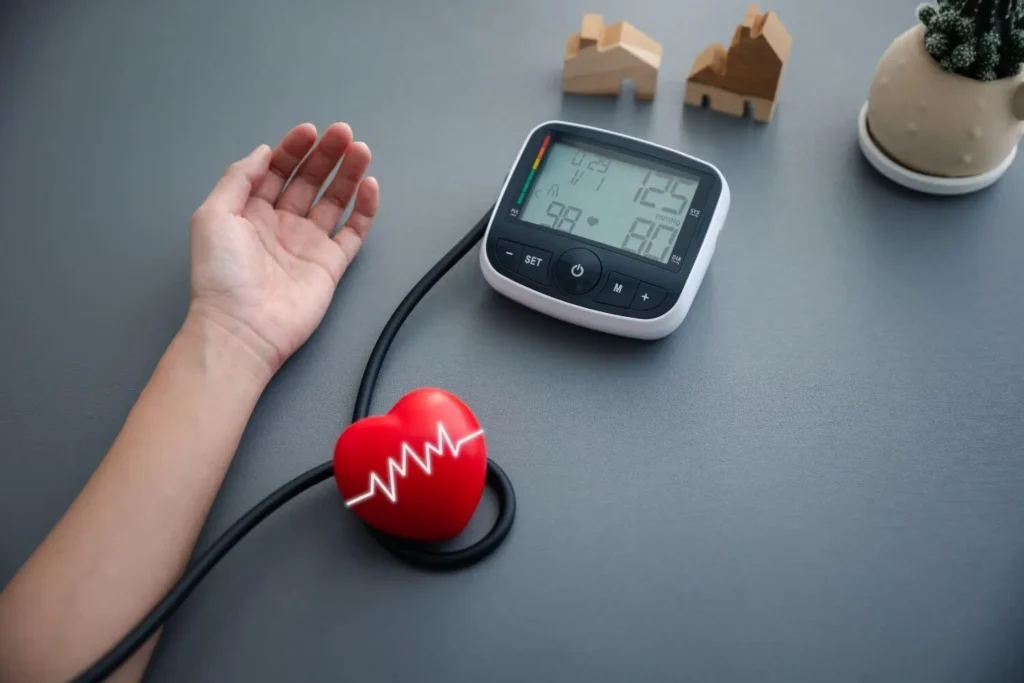
Managing blood pressure while on testosterone can be a vital part of maintaining long-term wellness. Knowing how to lower blood pressure while on testosterone is essential, as hormone therapy can sometimes affect cardiovascular health. Implementing the right lifestyle choices and understanding medical recommendations can make a significant difference. From dietary changes and exercise routines to stress management, there are practical steps to help you stay in control. This guide covers proven strategies that promote heart health and well-being while supporting your hormone journey. Let’s dive into the content to learn more.
How to Lower Blood Pressure While on Testosterone
To keep blood pressure balanced while on testosterone therapy, incorporating effective exercise routines like Bicep Workouts Without Weights can contribute significantly to heart health. Regular physical activity, including moderate aerobic exercises, enhances heart strength and circulation, supporting optimal blood pressure levels. Alongside these workouts, a diet rich in vegetables, fruits, lean proteins, and whole grains helps promote cardiovascular wellness. Limiting salt and choosing potassium-rich foods, such as bananas and spinach, assist in maintaining electrolyte balance. Additionally, mindfulness practices like meditation can reduce stress, aiding in blood pressure control. Regular check-ups with healthcare providers ensure a safe approach, enabling individuals to benefit fully from testosterone therapy.
Understanding the Link Between Testosterone and Blood Pressure
Research shows that testosterone levels and blood pressure are closely connected, impacting overall cardiovascular health. Testosterone plays a significant role in regulating various bodily functions, including vascular tone, which can affect blood vessel constriction and relaxation. Some studies indicate that increased testosterone levels may lead to higher blood pressure, primarily through mechanisms like increased fluid retention and enhanced vascular responsiveness. However, this connection is complex, as testosterone can have varying effects depending on age, dosage, and individual health factors. By understanding this relationship, individuals can make informed choices to monitor their blood pressure and maintain a balanced approach to testosterone therapy, prioritising heart and vascular health.
Natural Remedies to Support Healthy Blood Pressure Levels
For individuals on testosterone therapy, managing blood pressure naturally can be a practical and supportive approach to overall wellness. Certain lifestyle adjustments, such as adopting a diet rich in potassium, magnesium, and fibre, can significantly benefit blood pressure levels. Foods like leafy greens, bananas, avocados, and whole grains contribute essential nutrients that support heart health. Additionally, reducing sodium intake and staying hydrated can help regulate blood pressure by minimising fluid retention. Regular physical activity, such as walking or swimming, can further enhance cardiovascular health without straining the body. Complementing these habits with stress management techniques, including deep breathing exercises and mindfulness, may provide lasting support for maintaining healthy blood pressure alongside testosterone therapy.
Incorporating Exercise to Balance Cardiovascular Health
Regular physical activity plays a crucial role in supporting cardiovascular health, especially for those on testosterone therapy. Engaging in consistent aerobic exercises like brisk walking, cycling, or swimming can help improve blood circulation, reduce arterial stiffness, and manage blood pressure levels. Incorporating strength training exercises can further enhance heart function by strengthening the muscles around the heart, promoting better oxygen flow throughout the body. Additionally, exercise has been shown to lower stress hormones, which contributes to more stable blood pressure. A balanced fitness routine tailored to individual capabilities can be an effective step toward maintaining cardiovascular well-being while managing the effects of testosterone therapy.
Dietary Adjustments for Blood Pressure Control
When managing blood pressure while on testosterone therapy, dietary adjustments can play a significant role in maintaining overall cardiovascular health. A diet rich in fruits, vegetables, whole grains, and lean proteins, particularly fish high in omega-3 fatty acids, supports heart function and can help regulate blood pressure levels. Reducing sodium intake is crucial, as high salt consumption is often linked to elevated blood pressure; instead, seasoning with herbs and spices can enhance flavour without the added sodium. Including foods rich in potassium, such as bananas, spinach, and sweet potatoes, also helps balance sodium levels and supports proper vascular function. Additionally, minimising processed foods and focusing on fresh, nutrient-dense options can provide the body with essential vitamins and minerals, fostering an environment where blood pressure is more easily managed alongside hormone therapy.
The Role of Hydration and Its Impact on Blood Pressure
Staying well-hydrated plays a crucial role in managing blood pressure, especially for individuals on testosterone therapy. Water supports optimal blood flow by keeping blood vessels relaxed and flexible, which helps ease the workload on the heart. Proper hydration also aids in balancing electrolytes, which can help to counteract sodium levels that often contribute to increased blood pressure. Additionally, maintaining hydration helps reduce strain on the kidneys, allowing them to effectively regulate blood pressure and fluid balance in the body. By prioritising regular water intake, individuals can support their cardiovascular health, especially while on hormone treatments like testosterone, where staying hydrated can provide a stabilising effect on blood pressure levels.
Stress Management Techniques for Cardiovascular Health
Effectively managing stress is essential for maintaining cardiovascular health, especially for those on testosterone therapy. Chronic stress triggers the release of hormones like cortisol and adrenaline, which can raise blood pressure and put additional strain on the heart. Simple yet powerful techniques, such as regular deep breathing exercises, mindfulness meditation, and progressive muscle relaxation, can help calm the nervous system and reduce the physical impact of stress. Engaging in moderate physical activities like walking or stretching, coupled with a well-balanced diet rich in nutrients that support heart health, can further mitigate stress-related blood pressure spikes. By incorporating these habits, individuals can build resilience against stress, supporting both their cardiovascular health and overall well-being.
Importance of Regular Monitoring and Medical Checkups
Regular monitoring and consistent medical checkups are essential when managing blood pressure while on testosterone therapy. Routine checkups allow healthcare providers to keep track of any shifts in blood pressure and detect early signs of potential issues, ensuring adjustments can be made to treatment as needed. This proactive approach helps maintain balance, especially given that testosterone therapy can sometimes impact cardiovascular health. Monitoring not only enhances awareness of current health status but also supports a long-term strategy for preventing complications. With each checkup, patients gain valuable insights and receive tailored advice, helping them sustain optimal health throughout their treatment journey.
Potential Side Effects of Testosterone Therapy and How to Mitigate Them
Testosterone therapy, such as Clinic Trimix can be transformative for many individuals, but it’s essential to be mindful of potential side effects and ways to manage them. Common concerns include elevated blood pressure, mood swings, sleep apnea, and an increase in red blood cell count, all of which can impact overall well-being if not monitored carefully. To help mitigate these effects, adopting a balanced approach that includes regular cardiovascular exercise, a nutrient-rich diet, and routine check-ins with healthcare providers is crucial for tracking blood pressure and red blood cell levels. Incorporating relaxation techniques, such as deep breathing exercises or meditation, can also help manage stress, supporting stable blood pressure levels. Staying proactive with these strategies can enhance the benefits of Clinic Trimix therapy while minimising health risks.
Lifestyle Changes for Long-Term Blood Pressure Maintenance
Adopting lasting lifestyle habits can play a powerful role in keeping blood pressure within healthy limits while supporting overall wellness. Regular physical activity, a balanced diet rich in nutrients, and mindful practices like meditation help reinforce these efforts. Incorporating daily routines that prioritise heart health, such as moderating salt intake and getting quality sleep, adds another layer of support. These habits don’t just work in the background; they become integral to a lifestyle that promotes long-term stability. Staying connected with healthcare providers for regular check-ups also ensures any adjustments to blood pressure management are made promptly, empowering you to keep your wellness journey on track.
Enjoyed the Read? Share It!







